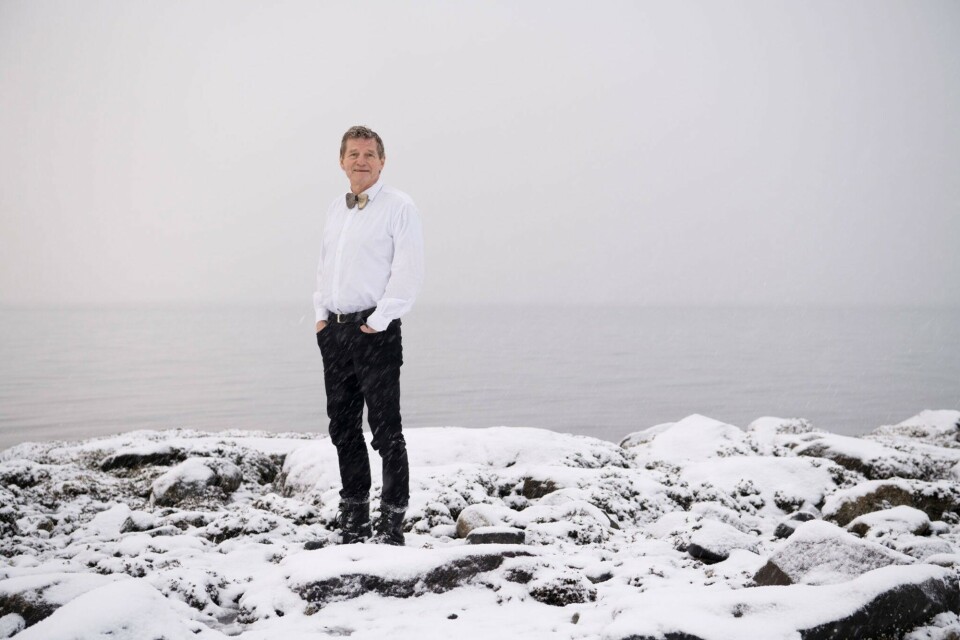
Profile 2020: Arctic giant on the lookout for adventure
Salve Dahle is inspired by the past, driven by the future, and lives for the pursuit of the unknown. Profile article 2020 is written by Christine Kristoffersen Hanssen.
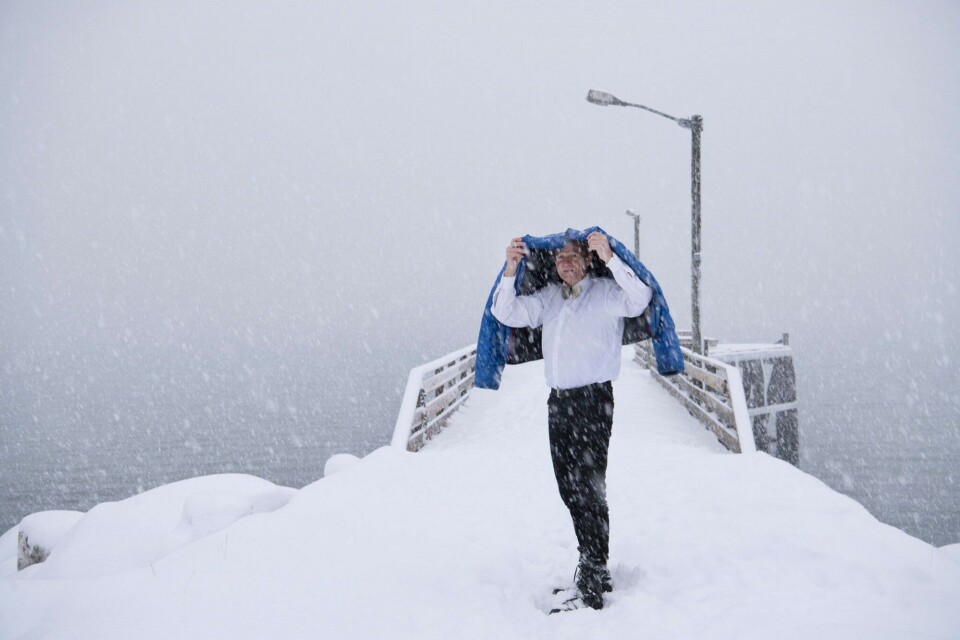
“I should probably start clearing out here. I’ve actually fetched a rubbish bag, but I haven’t got around to using it yet.”
Salve Dahle walks through his corner office in the Fram Centre. Between stacks of books and piles of papers, newspaper clippings, and brochures. A stuffed common guillemot collected at the nuclear testing site at Novaya Zemlya dangles upside down at the end of a string fastened to the ceiling, and a swarm of copepods, krill, and amphipods have found their final resting place in small test tubes on the nearby shelves. A warning sign with a bright red atomic symbol and Cyrillic lettering leans against the opposite wall. And next to the window with its stupendous view of mountains and ocean, there is a huge map of the High North.
Dahle has presided over the Managing Director’s office for 19 of his 32 years at Akvaplan-niva. In other words, he has had plenty of time to create this wild chaos of passion, job satisfaction, and adventure. From here, he has seen the workforce grow from a mere handful to today’s 135 employees, presented annual accounts showing a turnover of over NOK 200 million, established close and fruitful cooperation with Russia, and ensured a high level of professional development – thus creating a company with clout.
“I usually say we started by taking on minor tasks down by the seaside, and now we’ve worked our way up to national and international levels. It’s been an incredible journey. And I’ve been incredibly lucky to be along for the ride.”
Retirement can wait
Soon, Dahle will be handing over his keys. On 1 July 2019, he stepped down as Managing Director and Anton Giæver became Acting Managing Director. In March 2020, Dahle’s successor, Merete Kristiansen, will arrive to take over both the helm and the office.
“To be honest, it feels quite strange not being the manager, but at the same time, I must admit that it also feels great. Having 135 employees means dealing with 135 individuals. All of them are different, all of them have their issues – both in the workplace and in private. I must point out that we have an excellent system that supports good dialogue at all levels in the company. But still, when you come right down to it, I’ve been the person with overall responsibility. And it’s rather nice not to have to worry about that part anymore.”
Despite being 67 years old, Dahle doesn’t plan on retiring just yet. Instead, he has taken on the position of Project Director at Akvaplan-niva. He summarises his new job description quite simply: “To do everything that is fun”. In more formal terms, it means he will be in charge of developing and coordinating major projects, building networks, and training employees.
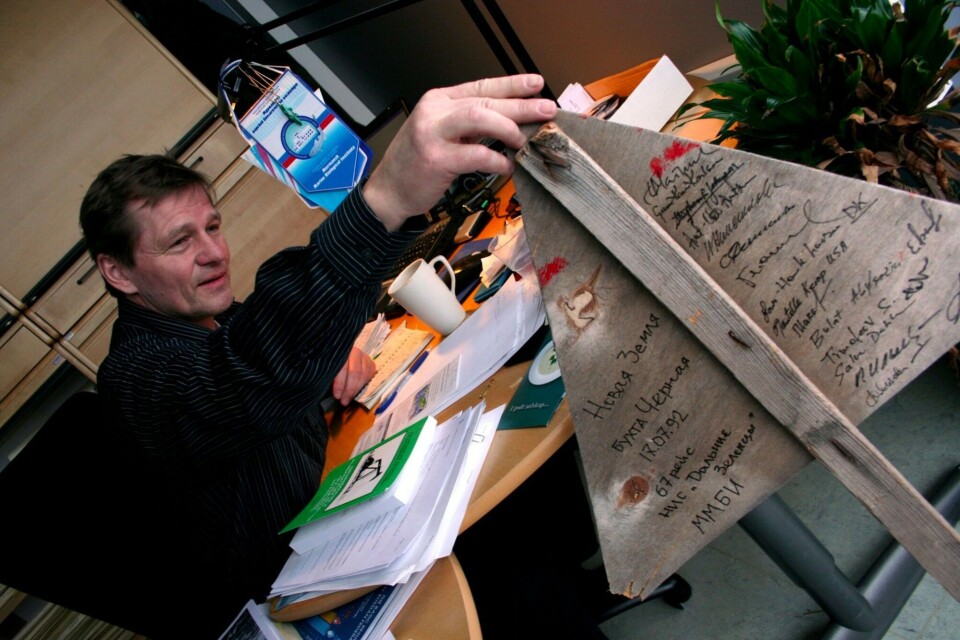
Eager to explore at an early age
Salve Dahle grew up in the small village of Finsland, on the outskirts of Kristiansand. His father built and maintained electricity lines, and his mother was a housewife. Young Salve was eager to explore and ready for adventure. As soon as he was old enough, he took the ferry across the strait of Skagerrak to Hirtshals in Denmark, and from there he hitchhiked around Europe. During his youth, summer holidays had two parts: he dedicated half the summer working to earn money and the other half to spend the money on his travels.
When Interrail was launched in 1972, Dahle was among the very first to buy a ticket. After several weeks of traveling, he eventually ended up in Israel. He became a member of a kibbutz and spent six months in this small communal settlement way out on the left-wing of the political spectrum. The inhabitants worked six hours each day in return for board and lodging. Dahle’s tasks involved everything from driving tractors and repairing machinery to picking citrus fruits, apples and cotton.
After returning to Norway, Dahle studied history and mathematics at the Teacher Training College in Trondheim (now part of the Norwegian University of Science and Technology), before beginning work as a teacher in Kåfjord. The reason he ended up in the north was simple: love. As early as secondary school, Dahle and his classmate Inger became friends, and a few years later they became inseparable.
When Inger gained admission to medical school in Tromsø, Dahle wanted to live as close as possible. They eventually moved first to Hammerfest and later to Mosjøen.
“When we arrived in Mosjøen, we had just become parents, and while Inger was in practice, I was a stay-at-home father. In the evenings, I taught and served as head of adult education. And I started scuba diving.”
Dahle describes this as a personal turning point and says his fascination for underwater life forms made him aware of a great need for formal education on the subject. When the family moved back to Tromsø, Dahle started studying again. During the early 1980s, he graduated as a marine biologist – and eventually became the father of three children.
He spent the next few years working with computers, but ultimately realised he had a decision to make. Should he continue in the field of computers or return to marine biology?
“I concluded that marine biology was more fun. A few years previously, two of my friends, Reidulf Juliussen and Stig Falk-Petersen, had founded what was then called Akvaplan. So when I got an opportunity to work with them, the decision was a really easy one to make.”
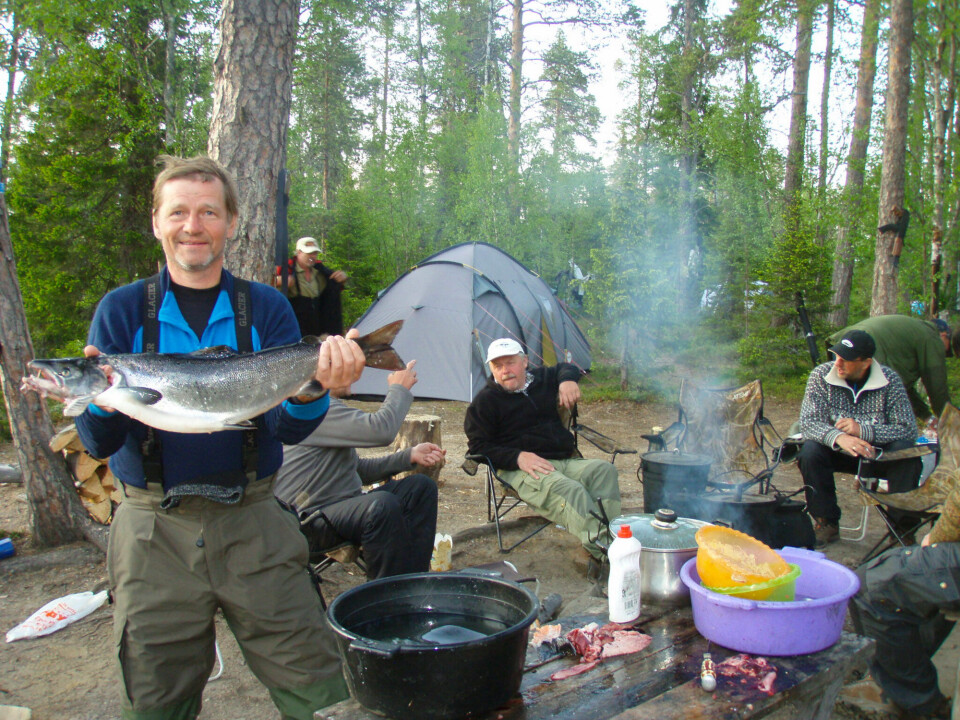
Mack beer and seagull eggs
Dahle describes those startup years as exciting, eventful, and full of wacky antics. For a period of time, Akvaplan had an office on the top floor of a building on the site where Nerstranda shopping centre now stands, just across the square from Tromsø‘s legendary pub “Skarven”. During one visit at the pub they wrangled permission to install a kind of pulley system between their office and Skarven. They constructed a polystyrene box in the shape of a salmon, where there was just enough room for four pints of beer and four seagull eggs.
“When we sent the salmon out the window, gravity took it all the way down to Skarven. The bartender loaded our regular order into the box, and we hauled up the goodies with a fishing reel.”
Was that a regular Friday ritual?
“Not at all! We sent that fish out the window whenever we felt the need. It didn’t have to be a Friday,” says Dahle with a broad smile.
When Dahle became part of the gang at Akvaplan, Reidulf Juliussen was the Managing Director. At about this time, the company was bought up by the Norwegian Institute for Water Research (NIVA) in several stages and renamed Akvaplan-niva AS.
In 2001, Dahle became the Managing Director.
“At that point, the company was in a very difficult situation, and two years later, in 2003, we ended up with a deficit of NOK 1.7 million. For me, that was a defining experience. I had to make people redundant, and we initiated a thorough strategic process to find a way to change our course.”
Turnaround
When Dahle is asked what he is most proud of during his career, it is precisely this turnaround he highlights.
“In our strategy process we decided to focus on research and building high-level competence, and at the same time to use that competence to develop products and services for the public and private market. As part of this strategy, we participated eagerly in the development of the ARCTOS research network together with colleagues from the University of Tromsø, the Norwegian Polar Institute and the University Centre in Svalbard. The idea, initiated by Paul Wassmann and Stig Falk-Petersen, was that we should have enough collective professional standing to develop and raise funding for large and long-term research projects. To kick-start this, I went to Statoil, which at that point was in the process of initiating several major undertakings in the north, and I told them there were a lot of important things they needed to know that they were unaware of. And I said we could help them gain that knowledge.
“It certainly wasn’t a given that we were going to succeed,” says Dahle.
“In the worst-case scenario, the Akvaplan saga could have ended here. Because if we don’t earn more money than we spend, we don’t survive. It’s that simple.”
And what was the bottom line the following year?
“We were out of the red. Just barely. But it was enough for us to continue. And since then, we have fortunately been able to avoid that situation.”
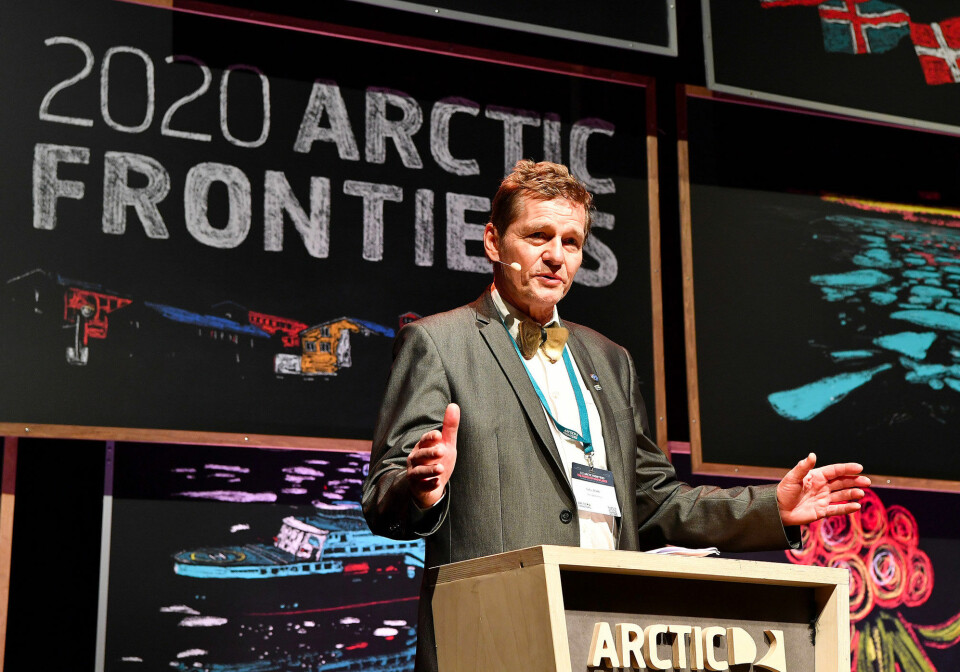
The Arctic Frontiers brainwave
Once Akvaplan-niva was on a solid financial footing, Dahle had the means and the opportunity to be innovative. What about an arena where research, trade and industry, management and other stakeholders could meet to focus on questions related to the High North? These thoughts were discussed with colleagues at ARCTOS. But where could they find financing for such an event? The work to obtain funding began in 2005. Gradually, entities such as the Research Council of Norway, ConocoPhillips, and Troms County agreed to support the initiative, and the first Arctic Frontiers conference was organised in 2007. The conference is held in Tromsø every January. In 2019, there were around 2500 registered participants.
“The goal was that Arctic Frontiers would become the most important international conference in the world for discussions related to the development of industry, society, and research in the Arctic. And now we’ve achieved it,” says Dahle. “One important element that we have always had in mind is that the conference should not simply promote Tromsø. The conference is held here, but our objective isn’t to promote our own people. It’s about creating a national team, including strong international participation, as well as solid participation of youth and young researchers.”
Ongoing global warming and the decline of Arctic sea ice have drawn increasing attention during Arctic Frontiers. What does this mean for people and industries in the High North?
“When you discuss climate change and emissions of CO2 due to the use of fossil fuels, you must put this in context – a global context. Access to energy has been a crucial factor for lifting hundreds of millions of people out of poverty during recent decades,” says Dahle.
“There are currently seven billion people on Earth, and the population is increasing by about 70 million each year. Human beings are consuming more and more of the Earth’s resources and the habitats of all other species are constantly shrinking and being degraded. The latest UN biodiversity report highlights the loss of habitat as the biggest threat. Providing food, clean water, and clean air to a growing population, while at the same time protecting the environment and other species’ habitats – that will be one of the world’s greatest challenges in the years to come.”
Keeping history alive
Both as the Managing Director at Akvaplan-niva and in connection with the development of Arctic Frontiers, Dahle’s focus has been on innovation, development and the future. However, his love of the north has just as much focus on the past. He was Chairman of the Arctic Society in Tromsø for eleven years and oversaw many projects, including the erection of a monument in memory of the polar explorer Helmer Hanssen.
“Tromsø as part of coastal Norway has an important history that must be cherished. This entire community is founded on what was achieved and created by those who came before us. Growing up in Norway and living here at the gateway to the Arctic Ocean has helped to stimulate my interest in history.”
It’s all about the constant pursuit of the unknown, of adventure.
“Is there anything more exciting than that?” asks Salve Dahle, before quickly answering his own question:
“No!”
This story is originally published by the Fram Forum
















